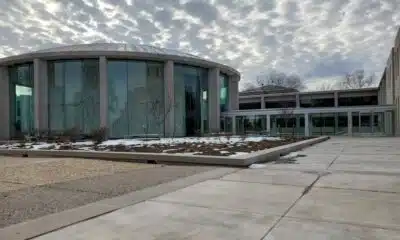News from the South - North Carolina News Feed
HCA plans to demolish St. Joseph’s Hospital, Mission spokesperson says • Asheville Watchdog
HCA Healthcare plans to demolish Mission Hospital’s St. Joseph’s campus, whose origins date back more than a century, Asheville Watchdog has learned.
Mission spokesperson Nancy Lindell said Thursday that a teardown was the only way forward after Tropical Storm Helene had compounded existing issues on the campus.
“Given current building codes and the deterioration of the facility exacerbated by the storm, the only real option for that campus is its eventual demolition,” Lindell said in a brief statement. “Plans will be made for demolition and future use of the site when appropriate.”
There have been rumblings about demolition of the campus for some time. Nurses told The Watchdog this week that they were informed of the eventual demolition by multiple members of leadership staff, including Mission CEO Greg Lowe at a recent employee town hall meeting.
Two main buildings make up the St. Joseph’s campus, located at 428 Biltmore Ave. These were built in 1960 and 1980, according to property records. The buildings and land combined are currently valued at $22 million. The $1.5 billion that HCA paid for the Mission Health system in 2019 included $547.8 for several facilities on the sprawling hospital campus In Asheville, including the St. Joseph’s land and buildings.
Records show nearly 30 permits for repairs and improvements on the nearly 12-acre property have been issued since 2015.
Dr. Scott Joslin served as medical director of Asheville Specialty Hospital, located on the St. Joseph’s campus, from January through September 2022 before he became head of Mission’s hospitalist program. Joslin told The Watchdog that Mission’s decision to build its North Tower facility in late 2019 was prompted partly by the recognition that the St. Joseph’s campus was nearing the end of its useful life.
Joslin, who now works at the Asheville VA Medical Center, described a range of issues facing St. Joseph’s at the time, including water leaks as well as electrical and infrastructure failures.
“I did know that at the time that the new North Tower was being built, that one of the drivers behind the decision … was that over time, the old St. Joseph’s Hospital was becoming more expensive to maintain,” Joslin said. “It was just going to be a question of time before the St. Joseph’s campus would be completely decommissioned.”
At the time of the opening of the North Tower, then-Mission CEO Chad Patrick noted that St. Joseph’s was “a very, very old building and very expensive to upkeep.”
Deep roots in Asheville
St. Joseph’s is an integral part of Asheville and Mission’s history. Its origins date to the beginning of the 20th century and a Catholic women’s organization dedicated to healthcare.
“On Nov. 23, 1900, the Sisters of Mercy arrived in the mountains of Western North Carolina, opening an 18-bed tuberculosis sanitarium on the corner of French Broad and Patton Avenues — the first iteration of St. Joseph’s Hospital,” the Mercy Urgent Care website says. “For nearly a century, Sisters of Mercy owned and operated Asheville’s St. Joseph’s Hospital, a 338-bed facility sold to Mission Hospitals in 1998. Mercy, however, retained and focused on its satellite urgent care facilities, expanding its network one community at a time.”
By the early 1990s, St. Joseph’s and Mission were the largest hospitals in western North Carolina.

Mission Hospital was created when St. Joseph’s Hospital and Memorial Mission Medical Center began an organizational partnership in 1996. They jointly operated a laundry and a child care center to achieve efficiencies, and they had substantially overlapping medical staffs, according to research conducted by the Urban Institute.
The hospitals merged two years later, when Memorial Mission purchased St. Joseph’s from the Sisters of Mercy for $90 million.
St. Joseph’s operations are mentioned in the Asset Purchase Agreement, the 2019 document defining the parameters of the sale to HCA. The APA prevented HCA from shutting down anything at the campus for two years following the sale.
“From and after such two (2)-year period, buyer shall have the right to discontinue any LTAC (Long-term Acute Care) Service at the St. Joseph campus of Mission Hospital (Asheville, North Carolina),” the APA states.
When the APA was being finalized, HCA didn’t have any plans to shutter St. Joseph’s or the care provided there.
“Buyer has no present intent to discontinue long-term acute care services at the St. Joseph campus of Mission Hospital, as described in Section 7.13(e), until those services can be provided at other Buyer facilities in Asheville, North Carolina,” the APA states.
In addition to Asheville Specialty Hospital, the campus also has housed inpatient and outpatient services for multiple departments, including the entirety of the behavioral health department — in a separate building — before it moved to its new Sweeten Creek facility.
In November, The Watchdog reported that Asheville Specialty, the only long-term acute care hospital in western North Carolina, would be shuttered.
Lindell said then that Mission Health made the decision because it “had to focus on prioritizing our resources during and after Hurricane Helene to care for the most urgent medical needs of our community.”
Asheville Watchdog is a nonprofit news team producing stories that matter to Asheville and Buncombe County. Andrew R. Jones is a Watchdog investigative reporter. Email arjones@avlwatchdog.org. The Watchdog’s local reporting during this crisis is made possible by donations from the community. To show your support for this vital public service go to avlwatchdog.org/support-our-publication/.
Related
The post HCA plans to demolish St. Joseph’s Hospital, Mission spokesperson says • Asheville Watchdog appeared first on avlwatchdog.org
News from the South - North Carolina News Feed
In Depth with Dan: Answering viewer questions about flesh-eating bacteria, digital licenses
SUMMARY: In this Monday mailbag, Dan addresses viewer questions on three topics. First, North Carolina’s Vibrio bacteria risk in summer coastal waters: cooked shellfish is safe, but raw consumption is risky due to bacteria concentrating in oysters. Second, digital driver’s licenses in North Carolina face delays; although legalized in 2023, full rollout may not occur until 2026, with other states also lagging behind. Lastly, Dan explains flood-damaged vehicles after recent storms: flooded cars must be branded as such, but scams occur. He shares tips to spot flood damage when buying used cars, emphasizing caution and thorough inspection.
WRAL anchor/reporter Dan Haggerty answered viewer questions about a flesh-eating bacteria in North Carolina and the legalization of digital driver’s licenses.
News from the South - North Carolina News Feed
The latest update on Tropical Storm Erin
SUMMARY: Tropical Storm Erin is forecast to become a Category 1 hurricane by Thursday and remain well out to sea through Saturday, near the Lesser Antilles northeast of Puerto Rico. Models show it moving west, then curving north toward Bermuda or Florida, but uncertainty remains high beyond next week. The American and European models suggest it could pass between Bermuda and Hatteras, causing higher surf midweek. Due to large forecast errors, the storm’s exact path is unclear, ranging from north of New York to the Florida panhandle. Residents should prepare hurricane kits and stay updated, with clearer guidance expected by Thursday or Friday.
Will Erin cause problems for the East Coast? Here’s the latest on Monday evening.
https://abc11.com/post/tracking-tropics-tropical-storm-erin-forms-eastern-tropical-atlantic-cabo-verde-islands/17499988/
Download: https://abc11.com/apps/
Like us on Facebook: https://www.facebook.com/ABC11/
Instagram: https://www.instagram.com/abc11_wtvd/
Threads: https://www.threads.net/@abc11_wtvd
TIKTOK: https://www.tiktok.com/@abc11_eyewitnessnews
X: https://x.com/ABC11_WTVD
News from the South - North Carolina News Feed
Body of missing NC teen found in Florida, family says
SUMMARY: The body of missing North Carolina teen Gio Gio was found in Bradenton, Florida, confirmed by his family. Originally, Gio Gio was supposed to be picked up by relatives after meeting cousins in Florida, but he disappeared after texting his mother for help. His family’s private investigators, not the police, discovered his body near I-75 after police had initially searched the area. Gio Gio’s mother expressed her heartbreak on Facebook, calling it every parent’s worst nightmare. The investigation continues, focusing on the timeline after Gio Gio entered the car with his cousins. An autopsy is pending, with no immediate signs of foul play.
The body of Giovanni Pelletier was found in a retention pond, authorities said, and his mom is living “every parent’s worst nightmare.”
https://abc11.com/post/giovanni-pelletier-body-missing-18-year-old-north-carolina-found-pond-where-last-seen-family-says/17483056/
Download: https://abc11.com/apps/
Like us on Facebook: https://www.facebook.com/ABC11/
Instagram: https://www.instagram.com/abc11_wtvd/
Threads: https://www.threads.net/@abc11_wtvd
TIKTOK: https://www.tiktok.com/@abc11_eyewitnessnews
X: https://x.com/ABC11_WTVD
-
News from the South - Oklahoma News Feed3 days ago
Former payroll director ordered to prison, must repay district nearly $500,000
-
News from the South - North Carolina News Feed6 days ago
Two people unaccounted for in Spring Lake after flash flooding
-
News from the South - Tennessee News Feed5 days ago
Trump’s new tariffs take effect. Here’s how Tennesseans could be impacted
-
News from the South - Texas News Feed4 days ago
Jim Lovell, Apollo 13 moon mission leader, dies at 97
-
News from the South - Missouri News Feed5 days ago
Man accused of running over Kansas City teacher with car before shooting, killing her
-
News from the South - Oklahoma News Feed6 days ago
Tulsa, OKC Resort to Hostile Architecture to Deter Homeless Encampments
-
News from the South - Arkansas News Feed6 days ago
Why congressional redistricting is blowing up across the US this summer
-
News from the South - Arkansas News Feed5 days ago
Arkansas courts director elected to national board of judicial administrators












































